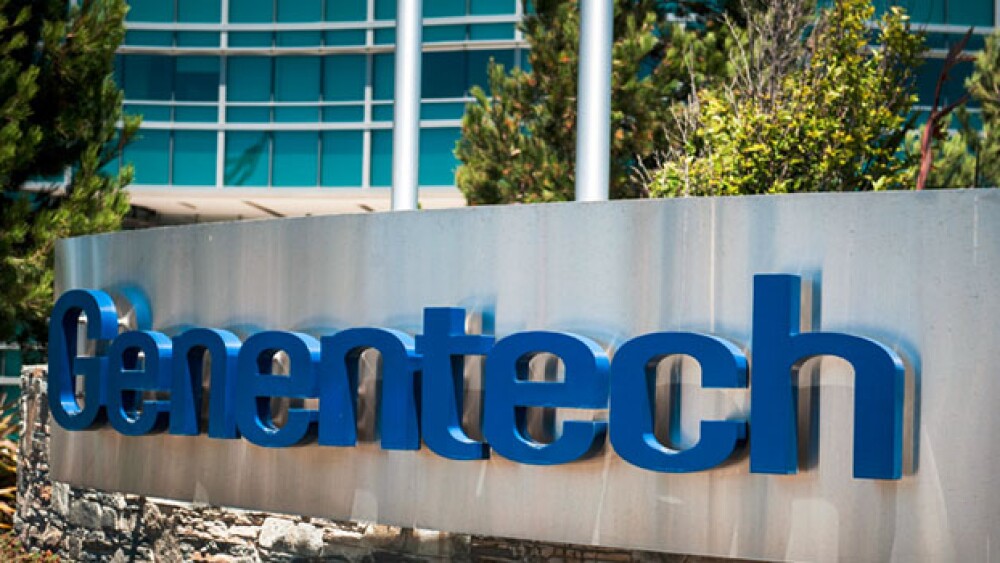A combination of Genentech’s Tecentriq and chemotherapy enabled some lung cancer patients in a Phase III trial to live significantly longer than chemotherapy alone. The latest report continues the string of successes the company has had with Tecentriq, an anti-PD-L1 immunotherapy.
A combination of Genentech’s Tecentriq and chemotherapy enabled some lung cancer patients in a Phase III trial to live significantly longer than chemotherapy alone. The latest report continues the string of successes the South San Francisco-based company has had with Tecentriq, an anti-PD-L1 immunotherapy.
Genentech, a Roche subsidiary, said its late-stage IMpower 130 study met its co-primary endpoints of overall survival and progression-free survival. The study paired Tecentriq (atezolizumab) with the chemotherapy drugs (carboplatin and Celgene’s Abraxane) and was tested as a first-line treatment in patients with advanced non-squamous non-small cell lung cancer (NSCLC). Additionally, Genentech said the combination reduced the risk of the disease worsening or death in comparison to chemotherapy alone. Safety for the combination was consistent with other studies involving Tecentriq and chemo drugs.
Genentech’s IMpower130 is a Phase III, multicenter, open-label, randomized study evaluating the efficacy and safety of Tecentriq in combination with carboplatin and nab-paclitaxel versus chemotherapy alone for chemotherapy-naïve patients with stage IV non-squamous NSCLC. The study enrolled 724 people.
Sandra Horning, Genentech’s chief medical officer and head of global product development, said the latest study results “add to the growing evidence showing the clinical benefit of Tecentriq-based combinations in the treatment of advanced non-squamous non-small cell lung cancer.” Horning said the company plans to share the results with global regulatory agencies in order to secure additional approval for the checkpoint inhibitor.
According to the American Cancer Society, it is estimated that more than 234,000 Americans will be diagnosed with lung cancer in 2018, and NSCLC accounts for 85 percent of all lung cancers. It is also estimated that about 60 percent of those lung cancer diagnoses in the United States are made when the disease is in the advanced stages, Genentech said, citing the ACS data.
The positive news of the IMpower 130 study comes two months after Genentech reported its IMpower 131 study of Tecentriq (atezolizumab) combined with carboplatin and Abraxane met its co-primary endpoint of progression-free survival in lung cancer. In that study Genentech said it did not observe a statistically significant overall survival benefit.
Currently, Genentech has eight Phase III lung cancer studies underway evaluating Tecentriq alone or in combination with other medicines. This is the third positive Phase III study evaluating Tecentriq alone or in combination to demonstrate an overall survival benefit for people with NSCLC.
Over the past few months, Genentech has seen a number of positive results with its Tecentriq studies. In February the company reported that a combination of Tecentriq and Avastin bevacizumab) was significantly beneficial to patients with advanced or metastatic renal cell carcinoma (mRCC) who have not received prior systemic active or experimental therapy. Genentech said the Phase III combination therapy improved progression-free survival by 26 percent in mRCC patients whose disease expressed a PD-L1 protein.
In March the U.S. Food and Drug Administration (FDA) granted a combination of Tecentriq, Avastin and the chemotherapy drugs paclitaxel and carboplatin Priority Review as a first-line treatment of patients with metastatic non-squamous non-small cell lung cancer. The FDA also accepted a supplemental Biologics License Application based on data from the Phase III IMpower150 trial, which met its co-primary endpoints of overall survival (OS) and progression-free survival (PFS).





